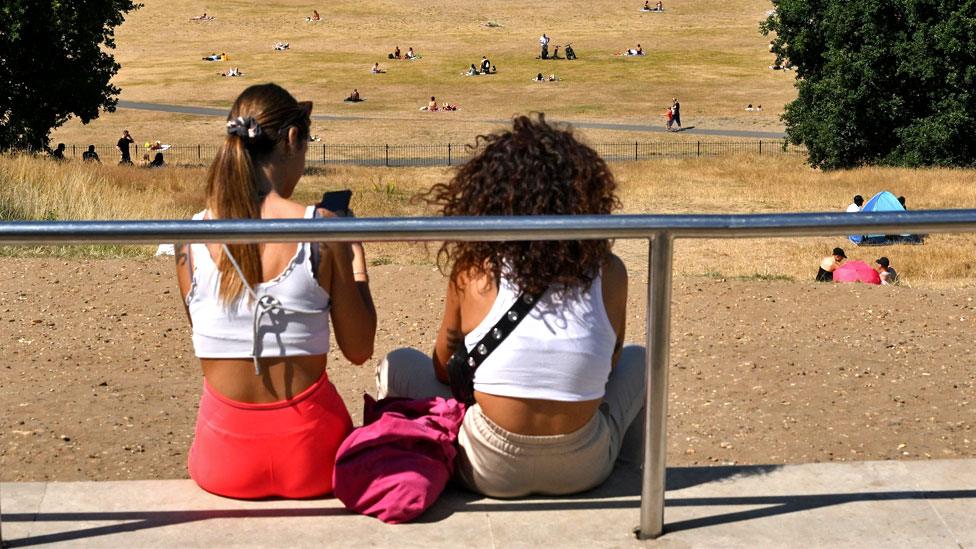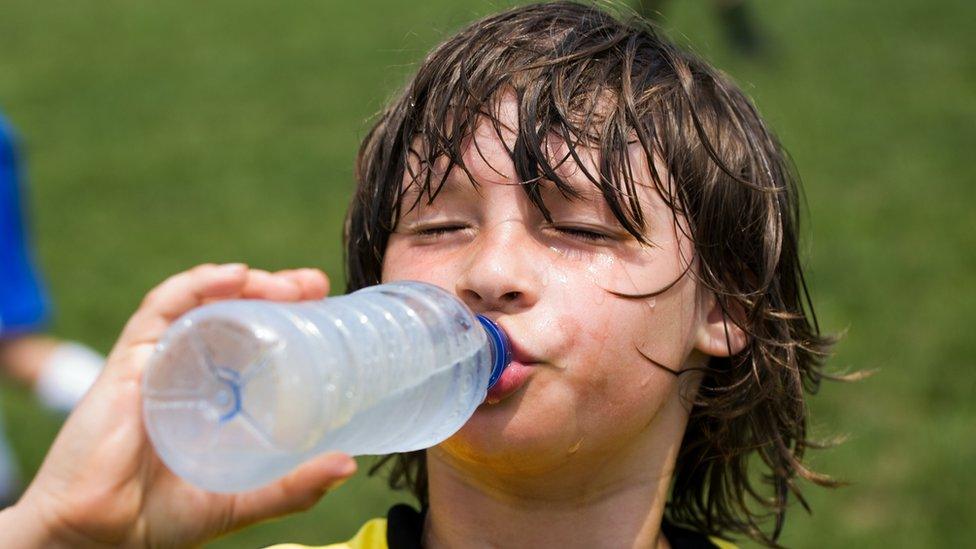Heatwave: Why does hot weather make you drowsy? And other questions
- Published
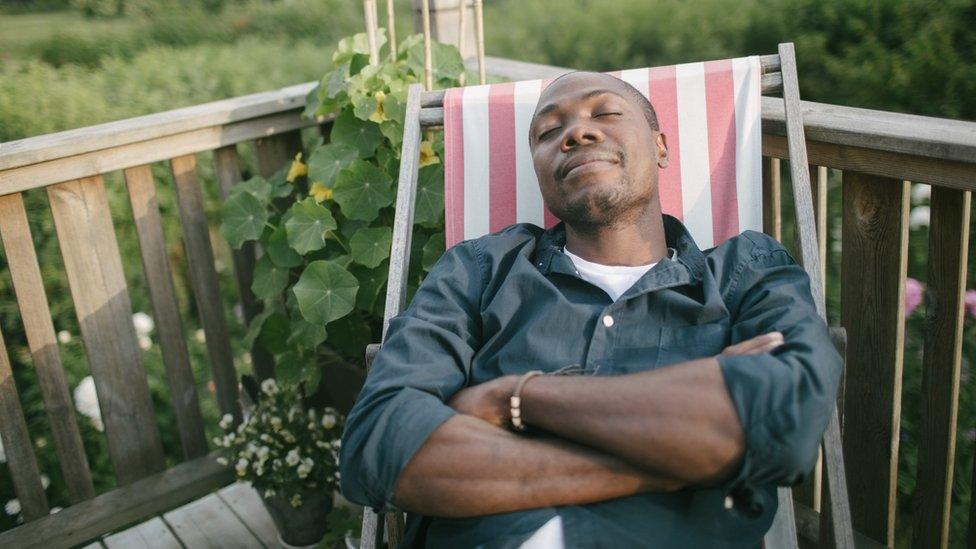
The UK has hit its hottest temperature on record, according to provisional figures.
London's Heathrow airport reached 40.2C at Tuesday lunchtime - the first time a temperature of more than 40 degrees has been recorded in the UK.
Before this current heatwave, the previous record was 38.7C, recorded in Cambridge in July 2019.
BBC experts answer your questions about the hot weather.
Michelle Roberts - digital health editor
Pallab Ghosh - science correspondent
Alice Evans - education reporter
Nikki Berry - weather forecaster
Why does hot weather make you drowsy? Geoffrey Herbert, Northampton
While the temperature in the outside world can fluctuate wildly, our bodies strive to keep a stable core temperature for our internal organs to function well. That takes lots of energy to regulate.
On a hot day, your body has to work hard to keep cool.
Chuck in a bit of dehydration and poor sleep, and it is no wonder you may feel a bit tired.
Fatigue is also your body's way of telling you to slow down a bit. Good advice when the weather forecast predicts highs of more than 40C.
Remember to watch out for heat exhaustion and heatstroke - when your body is becoming dangerously hot. Heatstroke is a medical emergency.
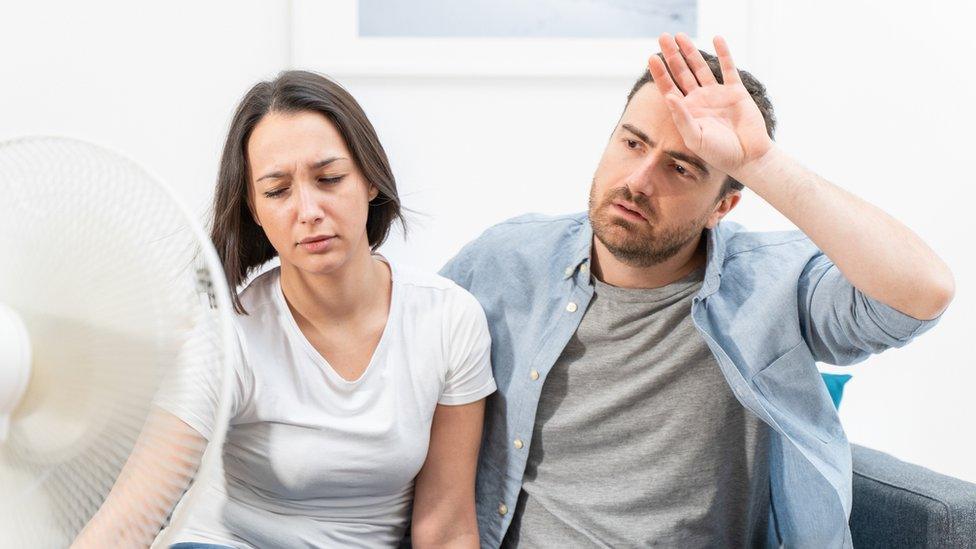
I'm doing all the right things - curtains closed, windows open, using a fan - but upstairs is still like an oven. What more can I do? Andrew Yeo, Cardiff.
UK homes are designed to keep in warm air. Before temperatures rise, close all windows, external doors, blinds and curtains.
To let in as much cold air as possible, open the windows overnight or for a couple of hours before going to bed, or in the early morning when the air temperature is lowest.
Once the temperature starts dropping again, open windows on opposite sides of your home, to let hot air out and cold in. Open your loft hatch or any loft room windows, as hot air rises. In flats, which may have windows on one side only, open the front door and use a fan to encourage airflow.
Placing a bowl of ice in front of an electric fan will help cool the air being circulated.
Avoid cooking for long periods if you can, or running any unnecessary electrical appliances that generate heat.
What is the danger of contracting skin cancer during this red alert? I have seen so many burning red bodies sunbathing in the sun! Anon, Cambridge
According to Cancer Research UK, there are almost 17,000 new cases of melanoma skin cancer each year in the UK. Sun exposure is the main risk factor, because it damages the skin.
Going red with sunburn means your skin cells have been damaged by too much sun.
Getting sunburnt just once every two years can triple your risk of melanoma compared to never being burnt, says the charity.
Even if you have very dark or black skin, you could still get skin cancer.
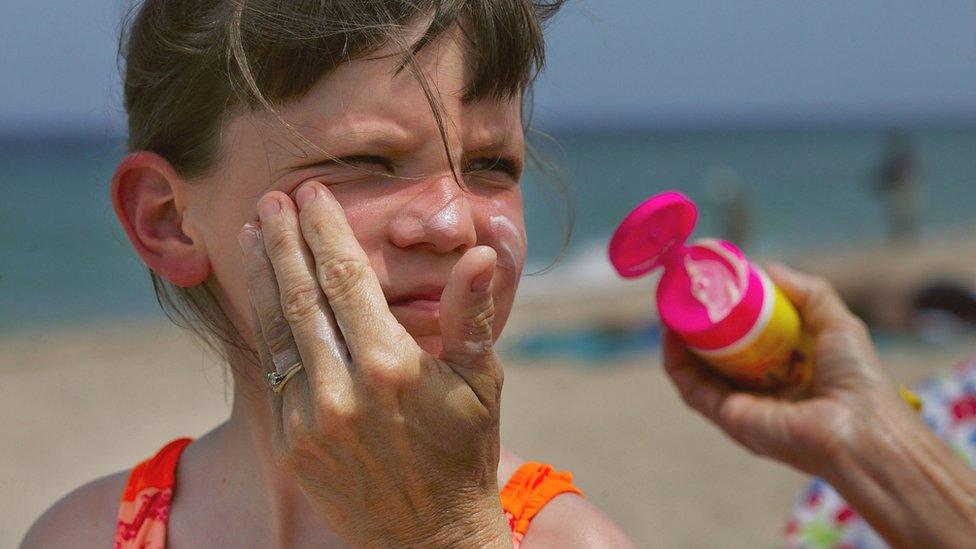
Covering up and wearing sunscreen on sunny days can protect the skin from the sun's harmful rays.
Experts advise people to use sunscreen that is at least SPF 30 and is broad spectrum - which means it filters out both UVA and UVB rays. It should also be water-resistant.
Could we potentially see even harsher effects of global warming - like in Southern Europe - in years to come? Sayon, Sutton.
Unfortunately, the answer is yes. Scientific assessments indicate that as well as a gradual warming, there will be more extreme weather events more often. The latest projections by the UK's Met Office indicate that heatwaves are now 30 times more likely to happen due to climate change. By 2050, they are expected to occur every other year.
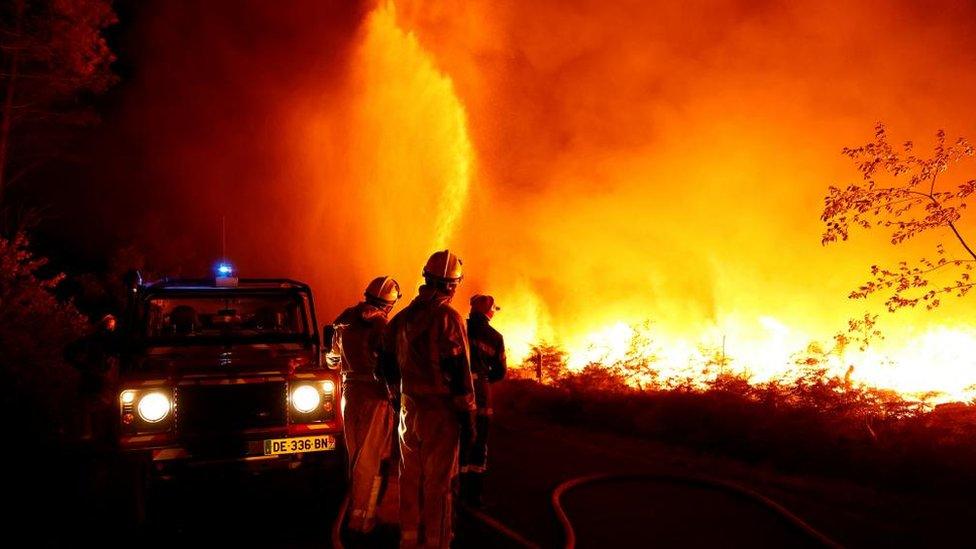
Fires in the south of France have ravaged 17,000 hectares (42,000 acres) of land since 12 July
Heatwaves caused an additional 2,000 deaths in 2020, according to the UK Health Security Agency. That figure is likely to triple in coming decades without government action, according to Baroness Brown, deputy chair of the Climate Change Committee.
But just how bad things get depend on how quickly the world can reduce its carbon emissions and other dangerous greenhouse gasses. Even if we were to stop all emissions today, we would not prevent some changes. However, the sooner we cut emissions, the smaller the changes will be.
Is it worth wearing a damp cloth around the neck to help keep cool? S Wilson, Nottingham
As well as drinking plenty of water to stay hydrated, cooling your skin with water is a good idea.
When liquid evaporates from surfaces it cools them. You could use a cool wet sponge or flannel, or a cool water spray. Lukewarm water also works.
But avoid showering or bathing in freezing cold water, because that will cause the blood vessels to tighten up, which could restrict blood flow.
Cold packs around the neck and armpits can also help keep you cool. Do what feels comfortable for you.
How can we keep our pets cool? Ella, Nottingham
Just like humans, animals can suffer from heatstroke.
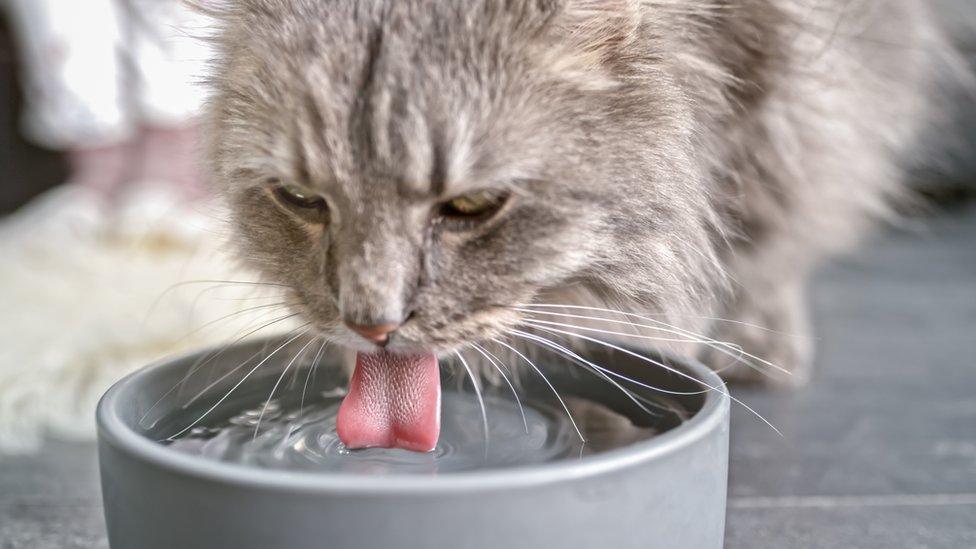
Pets should have constant access to fresh water
The RSPCA says pets should never be left in cars, conservatories, outbuildings or caravans when it's warm, even if it's just for a short while.
To keep them safe, the RSPCA advises providing: , external
shade
constant access to fresh water
ice cubes in their water bowl
damp towels to lie on
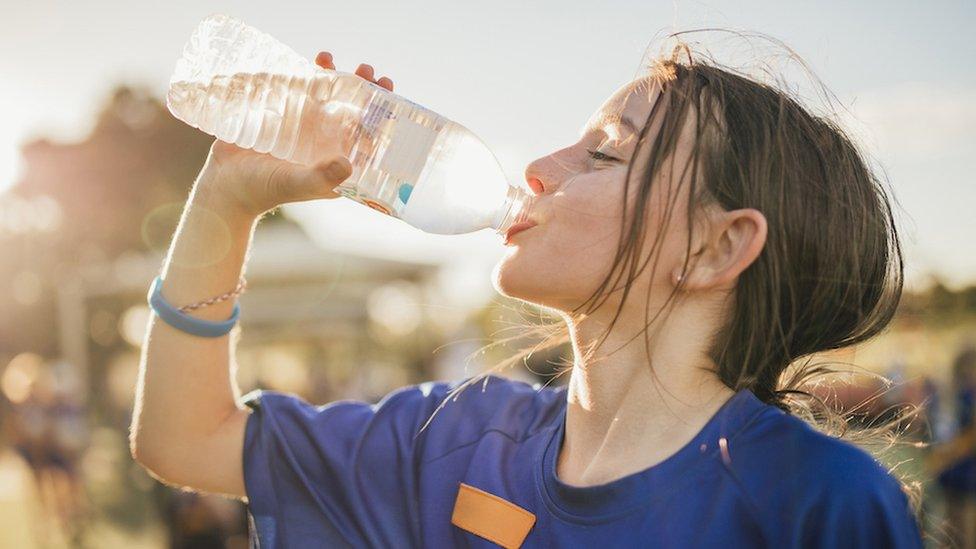
Should schools close during this extreme heat? Kelly Ng
Schools haven't been ordered to close. Instead, they have been asked to take steps to make sure pupils stay safe and comfortable.
Guidance issued for schools, external in England includes:
giving children lots of water
closing windows and blinds, as long as classrooms stay ventilated
using mechanical fans
watching out for signs of heatstroke and exhaustion
Other measures schools are taking include relaxing uniform rules, handing out ice lollies and rescheduling sports days.
Some have decided to close early and others are choosing to close completely.
Should we paint our roofs white to keep our homes cool? John Walsh, Cornwall
White reflects more light than dark colours. Lighter-coloured roofs have been used to keep buildings cool across the Middle East, North Africa and India for centuries.
It can be particularly effective in cities, which can experience a build-up of temperature.
However, the UK still continues to experience cold weather, and dark roofs can help to warm a home in winter.
There are other solutions to keeping a home cool including:
reducing large windows
increasing overhangs to reduce direct sunlight on windows
installing draught excluders to prevent cool air escaping
My husband works on a golf course and is being made to use holiday because of the heatwave. Is this right? Rachael Mason
An employer has the right to tell a worker to take any holiday they have built up on specified dates, says Emma Bartlett - an employment partner at law firm CM Murray.
The notice must be at least twice as long as the holiday to be used. For example, if an employer wants the worker to take five days' holiday, the employer must give at least 10 calendar days' notice.
Will temperatures be higher in built-up towns where the sun is magnified off the windows of high-rise buildings? Derek
Large urban areas tend to be warmer because there is relatively little bare earth and vegetation, and a high concentration of man-made materials. These absorb heat, rather than reflect it.
This phenomenon is known as an urban heat island, external.
However, while heat generated by transport can contribute, the reflection of the sun off windows does not.
As London has the largest urban sprawl, it tends to have record high temperatures.
What's the outlook later on in the summer? Tim Scott, East Grinstead, West Sussex
There will be a considerable cool-down on Wednesday, with maximum temperatures falling by 10-15C compared with Tuesday.
It will still be warm across parts of the South and East through the remainder of July.
Temperatures will be in the high 20s at times, but there are no signs of a return of any major heat.
A warmer than normal August looks likely for the UK - but it is extremely unlikely we will see anything like this current hot spell.
Why is it taking longer for temperatures to cool down at the end of the day? The hottest point of the day seems to be later now. Sarah B, Leamington Spa
In this current weather pattern, we have an extremely warm air mass pushing up from Spain.
Air masses are defined by the temperature and humidity in a layer 0.9 miles (1.5km) up in the atmosphere. The temperature at that height is expected to peak at about 21:00-22:00BST on Monday for much of England and Wales.
This is also why the temperature will not cool very quickly overnight on Monday and why we are likely to see potentially record-breaking overnight temperatures.
How are you coping with the hot weather? You can get in touch by emailing haveyoursay@bbc.co.uk, external.
Please include a contact number if you are willing to speak to a BBC journalist. You can also get in touch in the following ways:
WhatsApp: +44 7756 165803, external
Tweet: @BBC_HaveYourSay, external
Or fill out the form below
Please read our terms & conditions and privacy policy
If you are reading this page and can't see the form you will need to visit the mobile version of the BBC website to submit your question or comment or you can email us at HaveYourSay@bbc.co.uk, external. Please include your name, age and location with any submission.

Related topics
- Published16 June 2022
